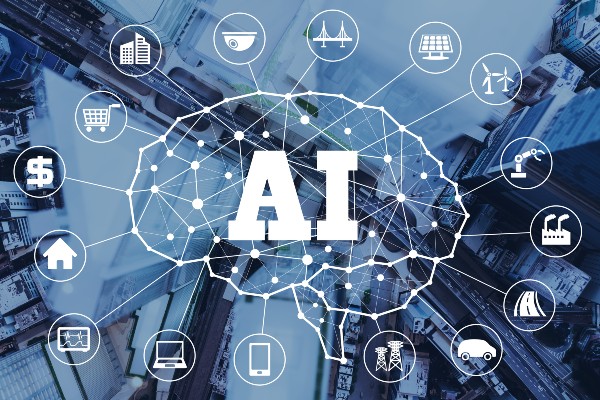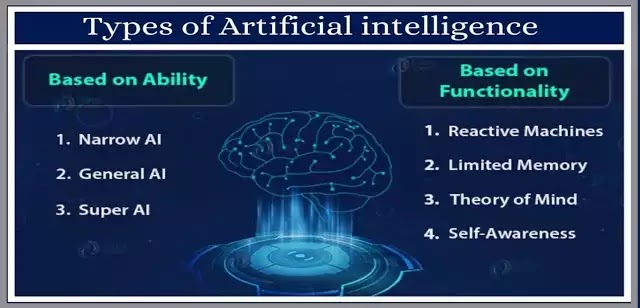The Power of Artificial Intelligence in the Digital Age
In today’s rapidly evolving digital landscape, Artificial Intelligence (AI) stands as a beacon of innovation, transforming the way we live, work, and interact with technology. Let’s delve into the intricacies of AI and how its unprecedented capabilities are reshaping our world.
What is the history of AI?
Artificial Intelligence, often abbreviated as AI, has a captivating history that has unfolded over the decades. From its nascent stages to the cutting-edge advancements we witness today, the evolution of AI is a testament to human ingenuity and technological prowess.

In the mid-20th century, the seeds of AI were sown as scientists and researchers delved into the possibilities of creating machines that could mimic human intelligence. Pioneering figures like Alan Turing laid the foundation for what would become a revolutionary field.
What is AI to explain?
In the fast-paced digital landscape, Artificial Intelligence (AI) has emerged as a revolutionary force. But what exactly is AI, and how does it shape our technological landscape? Let’s unravel the mysteries of AI together.
Decoding AI: A Brief Overview
Artificial Intelligence, commonly known as AI, refers to the simulation of human intelligence in machines programmed to think, learn, and problem-solve. It encompasses a wide range of technologies, from machine learning to natural language processing.
The Evolution of AI: From Fantasy to Reality
AI’s roots trace back to science fiction, where it was often portrayed as futuristic and unattainable. However, today, AI is not just a concept; it’s a tangible and integral part of our daily lives.
Applications of AI: Transforming Industries
1. Healthcare
AI is making significant strides in revolutionizing healthcare. From predictive analytics to personalized medicine, AI is enhancing diagnostics and patient care.
2. Finance
In the financial sector, AI algorithms analyze vast datasets in real-time, enabling better risk management, fraud detection, and investment strategies.
3. E-commerce
Online shopping experiences are becoming more personalized, thanks to AI. Recommendation engines and chatbots are streamlining customer interactions and improving satisfaction.
The Impact of AI on Business: A Strategic Advantage
Boosting Productivity and Efficiency
Businesses are leveraging AI to streamline operations, automate routine tasks, and enhance overall productivity. From customer service chatbots to data analysis tools, AI-driven solutions are providing companies with a competitive edge in today’s dynamic market.
Personalization and Customer Experience
AI’s ability to analyze user behavior enables businesses to tailor products and services to individual preferences. This level of personalization enhances customer satisfaction, fostering brand loyalty and driving long-term success.
How does AI work?
At its essence, AI mimics human intelligence through sophisticated algorithms and data processing. Unlike conventional programs, AI systems adapt and evolve, constantly learning from new information.
The Brainpower: Machine Learning Unveiled
In the realm of AI, Machine Learning (ML) is the driving force. This subfield empowers systems to learn patterns, make decisions, and improve performance without explicit programming. It’s the brainpower behind the AI revolution.
Neural Networks: Mirror of Human Thought
Picture AI as an intricate web of interconnected nodes—neural networks. These networks, inspired by the human brain, process information, enabling AI to recognize patterns, solve problems, and even make decisions autonomously.
Training the AI: Nurturing Intelligence
Just as a child learns from experience, AI requires training. Massive datasets are fed into the system, allowing it to recognize nuances and develop a nuanced understanding of its domain.
Data, the Lifeblood: Fueling AI Capabilities
Data is the lifeblood of AI. The more diverse and extensive the data, the sharper the AI’s capabilities become. It’s akin to providing the necessary ingredients for a chef to create a masterpiece.
Real-world Applications: AI’s Impact Across Industries
From healthcare to finance, AI transcends boundaries. Its applications are diverse, enhancing efficiency, accuracy, and innovation in sectors that range from customer service to scientific research.
The Future: AI’s Evolution and Continuous Advancements
As technology evolves, so does AI. Continuous research and development propel AI into new frontiers, promising even greater breakthroughs. The future holds exciting possibilities as AI continues to redefine the limits of what machines can achieve.
Why is artificial intelligence important?
The Evolution of Artificial Intelligence
AI has come a long way from being a concept in science fiction to becoming an integral part of our reality. Its evolution has been propelled by technological advancements, paving the way for unprecedented possibilities.
Enhancing Efficiency Across Industries
One of the key reasons why artificial intelligence is paramount lies in its ability to enhance efficiency across various industries. Through advanced algorithms and machine learning, AI systems streamline processes, reducing time and resource consumption. This not only boosts productivity but also allows for a more focused allocation of human resources.
Revolutionizing Healthcare
In the realm of healthcare, artificial intelligence is a game-changer. From diagnostic tools to personalized treatment plans, AI is contributing to more accurate and efficient healthcare solutions. This not only saves lives but also makes healthcare more accessible globally.
Transforming the Business Landscape
Businesses are increasingly leveraging AI to gain a competitive edge. From predictive analytics for strategic decision-making to chatbots enhancing customer service, artificial intelligence is reshaping the business landscape. Companies that embrace AI are positioned to adapt swiftly to market changes and stay ahead in the digital era.
AI and the Future of Work
The integration of artificial intelligence in the workplace is reshaping traditional job roles. While some tasks become automated, new opportunities emerge in the AI development and maintenance sector. Adapting to this shift is crucial for professionals in every industry to stay relevant and thrive in the evolving job market.
Societal Impact: A Double-Edged Sword
As AI continues to advance, addressing its societal impact becomes imperative. Ethical considerations, privacy concerns, and the potential for job displacement necessitate a thoughtful approach to AI development and implementation. Striking a balance between innovation and ethical use is key to harnessing the full potential of artificial intelligence.
What are 4 types of AI?
In the ever-evolving landscape of technology, Artificial Intelligence (AI) stands as a cornerstone, revolutionizing how we perceive and interact with the digital realm. Let’s delve into the realm of AI, unraveling the intricacies of the four distinct types that shape our digital future.

1. Understanding Narrow AI
Narrow AI, also known as Weak AI, constitutes the first tier of artificial intelligence. This type of AI is designed and trained for a specific task, excelling in performing predefined functions with remarkable precision. From virtual assistants to image recognition software, Narrow AI dominates various facets of our daily lives, making tasks more efficient and streamlined.
2. The Power of General AI
Contrasting Narrow AI, General AI possesses a broader spectrum of capabilities, akin to human intelligence. This type of AI has the potential to understand, learn, and apply knowledge across diverse domains. While General AI remains largely theoretical, envisioning machines with human-like cognitive abilities sparks excitement and contemplation about the future of technology.
3. Exploring Artificial Narrow Intelligence (ANI)
ANI, a subset of Narrow AI, is engineered to outperform humans in specific tasks. Its prowess lies in surpassing human capabilities within a confined scope, making it an invaluable asset in fields such as data analysis, language translation, and even strategic gaming. As we witness ANI’s exponential growth, its integration into various industries becomes a testament to its transformative potential.
4. The Uncharted Territory of Artificial Superintelligence (ASI)
Artificial Superintelligence, the apex of AI evolution, transcends human intellect in every aspect. ASI surpasses the cognitive capacities of the brightest minds, raising questions about its ethical implications and control. While ASI remains speculative, the concept prompts contemplation on the potential ramifications and societal shifts as we tread into uncharted territories of technological advancement.
Strong AI vs. weak AI
Strong AI, often termed Artificial General Intelligence (AGI), embodies the aspiration to replicate human intelligence across various tasks. Its capabilities extend beyond narrow domains, allowing it to comprehend, learn, and adapt across diverse scenarios.
In contrast, Weak AI, also known as Narrow AI, hones its expertise in specific tasks. Its proficiency is limited to a predefined set of functions, excelling within those boundaries without the expansive adaptability of Strong AI.
Examples of AI in Everyday Life
1. Virtual Personal Assistants
Virtual personal assistants like Siri and Alexa exemplify AI’s integration into our daily lives. These programs leverage natural language processing and machine learning algorithms to understand and respond to user commands, making our interactions with devices more intuitive.
2. Predictive Text and Autocorrect
Ever wondered how your smartphone anticipates the next word you’re about to type? That’s AI at play. Predictive text and autocorrect algorithms analyze your writing patterns, predicting and correcting words in real-time, streamlining the typing experience.
3. Image and Speech Recognition
AI’s capabilities extend to recognizing images and speech. Platforms like Google Photos use AI algorithms to categorize and identify objects in photos, while speech recognition technology powers virtual assistants and facilitates hands-free communication.
4. Recommendation Systems
The personalized recommendations you receive on streaming services or e-commerce platforms are powered by AI. These systems analyze your preferences, past behavior, and similar user data to suggest content or products tailored to your interests.
What are the applications of AI?
Harnessing Innovation: A Deep Dive into AI Applications
Artificial Intelligence (AI) is not just a technological buzzword; it’s a transformative force reshaping industries and daily life. Let’s explore the myriad applications of AI that are propelling us into the future.
Revolutionizing Healthcare with AI
In the realm of healthcare, AI is a game-changer. From diagnostic algorithms to personalized treatment plans, AI is revolutionizing patient care. Imagine a world where diseases are predicted before symptoms manifest, thanks to the analytical prowess of AI.
AI in Business: Enhancing Efficiency and Decision-Making
Businesses are leveraging AI to streamline operations and make data-driven decisions. Intelligent automation, powered by AI, is reducing manual tasks, increasing productivity, and paving the way for unparalleled efficiency.
Transforming Education through Intelligent Tutoring Systems
Education is undergoing a digital transformation, with AI at its core. Intelligent Tutoring Systems powered by AI provide personalized learning experiences, catering to individual student needs. The future of education is adaptive and AI-driven.
AI in Finance: Navigating the Complexities
In the financial sector, AI algorithms analyze vast datasets in real-time, providing insights that were once unimaginable. Fraud detection, risk management, and algorithmic trading are just a glimpse of AI’s impact on the financial landscape.
Augmented intelligence vs. artificial intelligence
In the realm of technological advancements, Augmented Intelligence emerges as a transformative force. Unlike its counterpart, it enriches human capabilities, blending the ingenuity of machines with human intuition.
In the technological arena, Artificial Intelligence (AI) stands tall, representing the pinnacle of machine intelligence. It is a self-learning system that mimics human cognitive functions, aiming for autonomy and problem-solving prowess.
AI governance and regulations
In the fast-paced realm of technology, Artificial Intelligence (AI) stands as a transformative force, revolutionizing industries and shaping the future. As this cutting-edge technology evolves, so does the need for robust AI governance and regulations. Let’s delve into the intricacies of this crucial facet, exploring its significance, challenges, and the roadmap for a responsible AI landscape.
The Pillars of AI Governance
1. Transparency and Accountability
Transparency in AI operations ensures that the decision-making processes are understandable and accountable. This foundational pillar establishes trust among users and stakeholders. Regulatory bodies are actively working on guidelines that mandate transparent AI algorithms, demystifying the complex mechanisms driving AI-driven decisions.
2. Ethical Use of AI
Ensuring the ethical deployment of AI technologies is a critical aspect of governance. Regulations are being crafted to prevent biases in AI algorithms, safeguarding against discriminatory practices. Striking a balance between innovation and ethical considerations is the linchpin for a sustainable AI ecosystem.
3. Data Privacy and Security
In the AI landscape, data is the lifeblood. Stringent regulations are being enforced to protect user data and privacy. From GDPR in Europe to evolving data protection laws globally, the emphasis on securing data against unauthorized access and misuse is shaping the contours of AI governance.
AI tools and services
In the fast-paced digital landscape, harnessing the power of AI tools and services is no longer a choice but a necessity for businesses striving to stay ahead. From streamlining operations to enhancing customer experiences, the impact of AI is undeniable. Let’s delve into the transformative realm of AI and discover how these advanced solutions can propel your success.
Revolutionizing Workflows with AI Integration
Embracing Efficiency with AI-Powered Automation Gone are the days of manual, time-consuming tasks. AI tools seamlessly integrate into your workflow, automating repetitive processes and allowing your team to focus on high-value initiatives. Whether it’s data analysis or routine administrative duties, AI enhances efficiency, unlocking a new level of productivity.
Personalization Redefined: AI in Customer Experiences
Crafting Tailored Interactions through AI Insights In the era of personalized experiences, AI stands as the driving force behind customer engagement. Leverage AI-generated insights to understand your audience better. From personalized recommendations to targeted marketing campaigns, AI ensures your brand connects with customers on a profound level, fostering loyalty and satisfaction.
The Security Shield: AI in Data Protection
Fortifying Digital Fortresses with AI-Powered Security With cyber threats evolving, securing your digital assets is paramount. AI-driven security solutions employ predictive analysis to detect and thwart potential breaches. Stay a step ahead of cybercriminals, safeguarding sensitive information and maintaining the trust of your clientele.
Breaking Language Barriers: AI in Communication
Facilitating Global Connectivity through AI Translation In a globalized world, effective communication knows no bounds. AI-driven language translation tools bridge linguistic gaps, enabling seamless communication across borders. Expand your reach and connect with diverse audiences effortlessly, breaking down language barriers that may hinder international collaborations.
Conclusion:
Artificial intelligence is not merely a technological advancement; it’s a revolution that permeates every facet of our lives. By understanding its fundamentals, applications, and ethical considerations, we can harness the power of AI to create a future that is not only intelligent but also responsible and inclusive.

